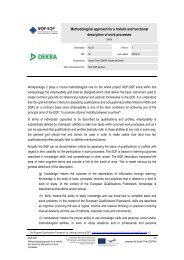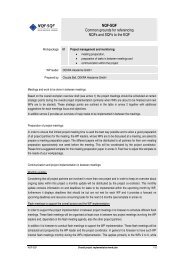Overview of National Qualification frameworks - Project-Nqf-Sqf
Overview of National Qualification frameworks - Project-Nqf-Sqf
Overview of National Qualification frameworks - Project-Nqf-Sqf
You also want an ePaper? Increase the reach of your titles
YUMPU automatically turns print PDFs into web optimized ePapers that Google loves.
There are many systems <strong>of</strong> qualification in France if we consider that a qualification refers to the act which consists inevaluating the skills <strong>of</strong> an individual against a “standard” defining the nature <strong>of</strong> those skills, the criteria used to assess thepossession <strong>of</strong> those skills, the methods <strong>of</strong> evaluation and the actors competent to evaluate.In 2002, the Law <strong>of</strong> January 17 allowed the creation <strong>of</strong> a <strong>National</strong> Vocational <strong>Qualification</strong>s Repertory (repertoire national desCertifications Pr<strong>of</strong>essionnelles – RNCP) to make an <strong>of</strong>ficial inventory <strong>of</strong> all the qualifications delivered in France correspondingto this definition. In addition, to be included in, the qualification must proposed certification process concerning formal, nonformal or informal learning, and especially a specific procedure named « validation des acquis d’expérience » (VAE) for the nonformal and informal learning recognition.Three kinds <strong>of</strong> qualifications are defined to be registered:__qualifications delivered by the ministry <strong>of</strong> Education and 6 other ministries which have specific committee composed byrepresentatives <strong>of</strong> the State and the social partners in charge specifically <strong>of</strong> agriculture, culture (only for some qualifications),employment, health, social affairs, youth and sports)__qualifications delivered by sectoral branches and decided through a social partners agreement__qualifications delivered by other ministries, public or private institutions or chambers <strong>of</strong> commerce.All the segments <strong>of</strong> educational French system (VET for young people and adults, Higher Education, sectorial qualification…)are integrated in the NQF.2.4 AustriaFigure 6Organisation <strong>of</strong> the education system in Austria 2008/2009Source: Eurydice, Organisation <strong>of</strong> the education system in France, Brussels, 2009Primary school (Grundschule) (ages 6 to 10)General secondary school (Hauptschule) (ages 10 to 14)__Within certain limits, each school may develop its own special pr<strong>of</strong>ile (e.g. languages, music, art and design, sports, science,ecology, computer science, etc.).__In addition, there are special types with a sports or music and arts bias.Special school (Sonderschule) (ages 6 to 15)Special schools comprise eight grades, or nine if polytechnic schools or a career preparation year are taken into account. Theycomprise ten different branches. Students receive a basic education from specially trained teachers who use methods tailoredto meet the child’s individual requirements; this schooling is designed to prepare the student for career training or furthereducation.Polytechnic school (Polytechnische Schule) (ages 14 to 15)NQF-SQF:"This project has been funded with support from12/13<strong>Overview</strong> <strong>of</strong> <strong>National</strong> <strong>Qualification</strong>prepared by 3s research laboratory<strong>frameworks</strong>the European Commission. This publicationreflects the views only <strong>of</strong> the author, and theCommission cannot be held responsible for anyuse which may be made <strong>of</strong> the informationcontained therein."




